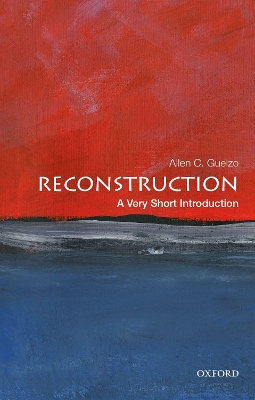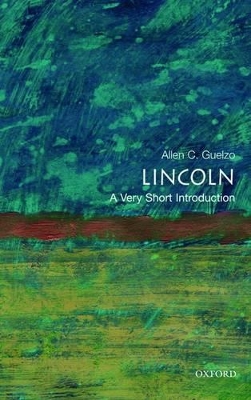Very Short Introductions
2 total works
The era known as Reconstruction is one of the unhappiest times in American history. It succeeded in reuniting the nation politically after the Civil War but in little else. Among its chief failures was the inability to chart a progressive course for race relations after the abolition of slavery and rise of Jim Crow. Reconstruction also struggled to successfully manage the Southern resistance towards a Northern, free-labor pattern. But the failures cannot obscure a
number of notable accomplishments, with decisive long-term consequences for American life: the 14th and 15th Amendments to the Constitution, the election of the first African American representatives to the US Congress, and the avoidance of any renewed outbreak of civil war. Reconstruction suffered
from poor leadership and uncertainty of direction, but it also laid the groundwork for renewed struggles for racial equality during the Civil Rights Movement.
This Very Short Introduction delves into the constitutional, political, and social issues behind Reconstruction to provide a lucid and original account of a historical moment that left an indelible mark on American social fabric. Award-winning historian Allen C. Guelzo depicts Reconstruction as a "bourgeois revolution" — as the attempted extension of the free-labor ideology embodied by Lincoln and the Republican Party to what was perceived as a Southern region gone astray from the
Founders' intention in the pursuit of Romantic aristocracy.
number of notable accomplishments, with decisive long-term consequences for American life: the 14th and 15th Amendments to the Constitution, the election of the first African American representatives to the US Congress, and the avoidance of any renewed outbreak of civil war. Reconstruction suffered
from poor leadership and uncertainty of direction, but it also laid the groundwork for renewed struggles for racial equality during the Civil Rights Movement.
This Very Short Introduction delves into the constitutional, political, and social issues behind Reconstruction to provide a lucid and original account of a historical moment that left an indelible mark on American social fabric. Award-winning historian Allen C. Guelzo depicts Reconstruction as a "bourgeois revolution" — as the attempted extension of the free-labor ideology embodied by Lincoln and the Republican Party to what was perceived as a Southern region gone astray from the
Founders' intention in the pursuit of Romantic aristocracy.
Beneath the surface of the apparently untutored and deceptively frank Abraham Lincoln ran private tunnels of self-taught study, a restless philosophical curiosity, and a profound grasp of the fundamentals of democracy. Now, in Lincoln: A Very Short Introduction, the award-winning Lincoln authority Allen C. Guelzo offers a penetrating look into the mind of one of our greatest presidents.
If Lincoln was famous for reading aloud from joke books, Guelzo shows that he also plunged deeply into the mainstream of nineteenth-century liberal democratic thought. Guelzo takes us on a wide-ranging exploration of seven problems that confronted Lincoln and liberal democracy-equality, opportunity, the rule of law, slavery, freedom, and reconciliation. The book sets these problems and Lincoln's responses against the larger world of American and trans-Atlantic liberal democracy in the
19th century, comparing Lincoln not just to Andrew Jackson or John Calhoun, but to British thinkers such as Richard Cobden, Jeremy Bentham, and John Bright, and to French observers Alexis de Tocqueville and Francois Guizot. The Lincoln we meet here is an Enlightenment figure who struggled to create a
common ground between a people focused on individual rights and a society eager to establish a certain moral, philosophical, and intellectual bedrock. Lincoln insisted that liberal democracy had a higher purpose, which was the realization of a morally right political order. But how to interject that sense of moral order into a system that values personal self-satisfaction-"the pursuit of happiness"-remains a fundamental dilemma even today.
Abraham Lincoln was a man who, according to his friend and biographer William Henry Herndon, "lived in the mind." Guelzo paints a marvelous portrait of this Lincoln-Lincoln the man of ideas-providing new insights into one of the giants of American history.
ABOUT THE SERIES: The Very Short Introductions series from Oxford University Press contains hundreds of titles in almost every subject area. These pocket-sized books are the perfect way to get ahead in a new subject quickly. Our expert authors combine facts, analysis, perspective, new ideas, and enthusiasm to make interesting and challenging topics highly readable.
If Lincoln was famous for reading aloud from joke books, Guelzo shows that he also plunged deeply into the mainstream of nineteenth-century liberal democratic thought. Guelzo takes us on a wide-ranging exploration of seven problems that confronted Lincoln and liberal democracy-equality, opportunity, the rule of law, slavery, freedom, and reconciliation. The book sets these problems and Lincoln's responses against the larger world of American and trans-Atlantic liberal democracy in the
19th century, comparing Lincoln not just to Andrew Jackson or John Calhoun, but to British thinkers such as Richard Cobden, Jeremy Bentham, and John Bright, and to French observers Alexis de Tocqueville and Francois Guizot. The Lincoln we meet here is an Enlightenment figure who struggled to create a
common ground between a people focused on individual rights and a society eager to establish a certain moral, philosophical, and intellectual bedrock. Lincoln insisted that liberal democracy had a higher purpose, which was the realization of a morally right political order. But how to interject that sense of moral order into a system that values personal self-satisfaction-"the pursuit of happiness"-remains a fundamental dilemma even today.
Abraham Lincoln was a man who, according to his friend and biographer William Henry Herndon, "lived in the mind." Guelzo paints a marvelous portrait of this Lincoln-Lincoln the man of ideas-providing new insights into one of the giants of American history.
ABOUT THE SERIES: The Very Short Introductions series from Oxford University Press contains hundreds of titles in almost every subject area. These pocket-sized books are the perfect way to get ahead in a new subject quickly. Our expert authors combine facts, analysis, perspective, new ideas, and enthusiasm to make interesting and challenging topics highly readable.

